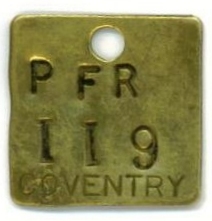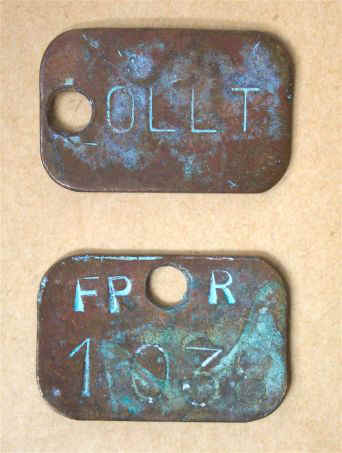Counter
Stamped Letters on Ollerton Colliery Lamp Checks.
Recently
I acquired twenty three brass pit checks similar to the ones shown below. I
understand that all of them originated from Ollerton Colliery in
Nottinghamshire.
Nearly
all of the checks are die stamped
with the letters "OLLT" on their obverse plus a unique
identification number on their reverse. In addition half of them bare
various hand
stamped letters on their reverses. On most
of the checks the suspension holes are located as shown in the top image below. However, a few
have been pierced in the 9 o'clock as apposed to the 12 o'clock position (see
bottom image below).
Two
typical examples (top obverse, below a reverse) of the stamped brass "OLLT"
checks. All are rectangular with rounded corners and measure 29 mm by 19
mm.
Of
the eleven checks which have hand stamped letters on their reverses several variations
are present. These included;
-
FPR
- 7 examples
-
FR
- 1 example
-
PER
- 1 example
-
EM
- 1 example
-
M
- 1 example
What
were these checks used for and what do the various sets of initials stamped on
their reverses signify?
Submitted By :
George Martin.
Date: October 2003
REPLY
No.1
I
have seen similar small rectangular checks which were salvaged at the time of
closure from the lamp rooms of three other Nottingham Area pits - Rufford,
Mansfield and
Bevercotes. In all three cases the now owners of these checks had literally hundreds
of them. The vast majority of the checks simply carried a hand stamped
identification number and nothing else. However, the obverses of a few
examples were machine stamped with their respective colliery names. I
guess it is possible that many Notts. Area pits used such checks during the
later N.C.B. period. However, given their basic and un-attributable design
most of them were deemed not worthy of saving but instead have found their way
into skips bound for scrap metal dealers. One NMMA member I have discussed
these simple rectangular checks with (Ivan Dawson) remembers using them when
he worked at Rufford Colliery. At Rufford each miner had three checks all of
which bore his personal identification number. Firstly a small round brass
embossed check which he was responsible for keeping safe. This was his pay
check. His two additional checks which were used to control and record his
descent into the mine. These were kept in the lamp room and were collected at
the start of each shift. The first of these two checks was an octagonal brass
embossed check while the second was one of the small rectangular numbered
checks. These latter checks were retained by the miners while they were
underground and were only surrendered to the banksman on being raised to the
surface at the end of each shift. While under ground the miners kept these
small checks safe by clipping them onto the battery casing of their cap lamps.
Presumably the other similar rectangular checks used at Bevercotes and
Ollerton (plus presumably other Notts. pits?) were used in a similar way.
I
am not sure what the various initials on the Ollerton checks stand for.
However, it strikes me that they may be similar to the hand stamped initials
found on many of the pear shaped brass embossed checks known from Tilmanstone
Colliery in Kent. At Tilmanstone it is understood that these initials
signified the trades etc. that each miner had been trained in. These initials
include the following;
D
- Drawer Off (Salvage Worker).
E
- Electrician
F
- Face Worker (Collier)
H
- Haulage Worker
M
- Mechanic
R
- Ripper (Stoneman or roadway enlargement)
It
is interesting that out of the five different letters found on the Ollerton
checks four of them (F,E,R,M) are the same as those found on checks mentioned
above from Kent. Given this I feel certain that they had the same meaning and
significance at Ollerton as they did at Tilmanstone. If this is the case I
wonder what the additional letter "P", found on the Ollerton checks,
could stand for? Does anyone know?
I
have an 1950s (?) book issued by the N.C.B. which lists all official colliery
working tasks and job titles and categories them against national pay scales.
Looking down this list of job titles their are many starting with the letter
"P". However, one in particular could have a direct comparison with
the "H" (for haulage engine operator) used at Tilmanstone - this is
"Paddy" Haulage Attendant (i.e. the man that operated the haulage
engine which drove the underground "Paddy" trains).
Submitted
By : Mark Smith (partly based on information supplied by Ivan Dawson).
Date:
October 2003
REPLY No.2
I
worked at Ollerton Colliery from 1983 until its untimely closure and can
remember using similar small rectangular checks to the ones illustrated
above. Some of these checks were stamped with the abbreviated name of the
pit (i.e. "OLLT") but I can't remember any of the other initials on the
reverse which are mentioned.
At Ollerton colliery we had two stamped brass check for controlling access
into the mine. One was round the other a small rectangular one. We collected
these checks at the start of each shift after having first reported to the
Deployment Boards prior to changing into our pit cloths.
The round checks were given to the banksman on entering the cage prior to
descending into the pit. The rectangular checks were retained by each man
while underground only to be given to the banksman on returning to the
surface. All checks were returned from the banksman back to the time office
via the use of a pneumatic canister conveying system.
The markings on the rectangular checks may be related to those similar
letters that we to be found on our deployment checks. These checks were
coloured (to denote which shift you were on) strips of tin (or similar) and
hung on pegs on various deployment boards located on the pit surface.
Depending on which board your deployment check had been hung by the colliery
officials denoted the area of the underground workings plus task each miner
had been assigned to each day.
The deployment checks
were different to the brass checks
and contained letters that reflected each mans under ground qualification or
work skills . These initials included;
F- Face Worker
F.M. - Face Market ("market"
workers were those who were able to rotate from different face work
tasks around the pit. Like a hit squad)
H - Haulage (i.e. some one
trained to oerate the rope haulage system).
G.H. - Gearhead Driver (someone
who was stationed at conveyor transfer points and "hit" the emergency
stop button at the head of their allocated conveyor if there was a
problem or proceeding belt trip. These workers were called "button boys"
in some other Nottinghamshire Area pits).
In addition to the checks described above I also remember the earlier use of
brass embossed pay checks at Ollerton. These were kept by each miner and
were stamped with their personal identification number. When I first
joined the pit I had an oval pay check but prior to my time at the pit
"polo" shaped ones had been used. The checks we had for controlling access
into the mine were not embossed with the colliery's name. Most just were
stamped with each miner's allocated safety lamp number. During the 1990s
when further Nottinghamshire pits were closing there was an influx of miners
to Ollerton from some of the closed pits. These men had new checks stamped
up for them by the time office. During this late period under British Coal
such new or replacement round checks were also stamped with the number "06"
in addition to the miner's unique lamp number. The former number acted as a
colliery identifier as Ollerton Colliery was designated at this time with
the number "6" out of the listing of those pits which remained in operation
in the area.
l
hope the above information is of some help.
Submitted By : Jim Ridley.
Date: June 2004
REPLY No.3
I
further check, thought to be of a similar age as the late British Coal issued
ones from Ollerton (see picture above), has now been reported from Coventry
Colliery in Warwickshire. This one also has the initials "PFR" hand stamped on
its obverse. What ever these initials indicate it looks like they were being
used at at least two pits in what was then left of the old British Coal Midlands
Area.

Late British Coal Coventry Colliery check bearing hand stamped initials "PFR".
Submitted By : Mark Smith.
Date: October 2009
If you can provide
any further information about the above items then please contact us via
the e-mail reply link below.
Previous
Home

